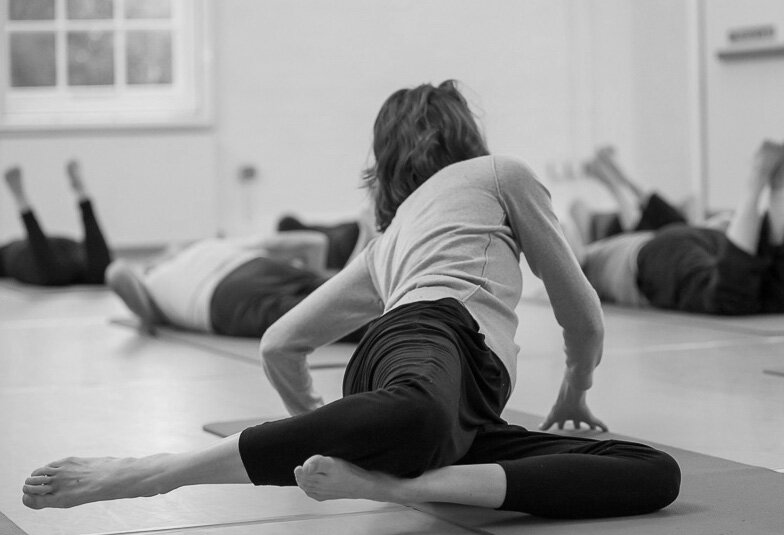Who can benefit from
Feldenkrais® lessons?
“Genius, in truth, is little more than the faculty of perceiving in an unhabitual way.”
Everyone.
I have never met a nervous system that could not learn, no matter what the circumstances. Your attitude of curiosity and exploration can bring about a major change in your habitual movement and experience. It can also improve your ability to perform daily tasks, whether you're lifting up your child, putting away the dishes, or training for a marathon.
how is this possible?
Have you ever watched a baby learn to roll over? Children learn to move by exploring their environment, not by saying to themselves, "Today's the day I'm going to roll over!" As adults, we have forgotten this curiosity. Usually, we tell ourselves to "Sit up straight!" or "Quit hunching!" However, improvement does not happen through a top-down edict issued from the front of the brain. Telling yourself how to move is like saying, "1-2-3 relax!" It doesn't work if your habit, protective pattern, tension, or injury says otherwise.
In Feldenkrais, you will use your own innate ability to sense your own skeleton to uncover the logical connection between your center of gravity and ease of movement. Most important, you can recreate yourself. That is the nature of our humanness: we can step outside the narrow definition of reality that our habits—and the habits our culture, relationships, and families—have given us.
letting go of painful habits
The Feldenkrais Method continues the education that was begun by every individual as a newborn infant by challenging the brain to relearn existing movement skills. How did you lose those skills? Through long-term habits. As you develop habits, you often block yourself from doing things in the simplest and most efficient way. It sounds obvious, but when we're stuck we stop learning and repeat the same strategy over and over. We limp along for years after an injury, stroke, emotional trauma, surgery, chronic pain, poor self-use, bad posture, joint problems, fatigue, or neurological challenges. Or we push for better physical performance with inefficient movement, leading to injury. Your habits may stem from any number of causes, including:
fatigue
insomnia
emotional trauma
not knowing what the skeleton can do
injury
pain
surgery
disease
athletics & the arts
To perform at your peak you want to be aware of every muscle and how it moves, without having to think about it. Yehudi Menuhin, Julius Irving, the Olympic Kayak Team, and countless other athletes and performing artists around the world have improved their performance thanks to Feldenkrais.
ADD/ ADHD
Many people with ADD/ADHD are actually brilliant, and kinesthetically talented. However, they cannot focus because the nervous system is so excited. Feldenkrais lessons help quiet the mind. They are also interesting and challenging, students feel the difference in their thinking process right away. Feldenkrais once said, "It's not flexible bodies I'm after, it's flexible minds.
tmj & migraines
There are so many causes for TMJ and migraines - ranging from stress to improper neck alignment. The student and teacher explore the movement patterns that have led to the TMJ and devise a program that gently re-organizes the head/neck/jaw relationship.
repetitive strain
Usually repetitive strain injuries occur because the muscle group has become fatigued, creating strains, tears and syndromes like carpal tunnel. Feldenkrais lessons help people learn to use more of the bigger muscles in the body to do the job - remember, every finger is connected ultimately to muscles in the back that can take the strain off the hand!
moving with difficulty
Many movement problems are the result of misuse and overuse - poor posture, arthritis, tendonitis to name a few. Even getting up from a chair the same way for 40 years can eventually cause problems. Bad habits can be unlearned, new, more efficient habits can be learned. For people who have movement problems due to injury, stroke or illness, the Feldenkrais Method provides a way to discover new movement pathways, literally re-training the nervous system so that improvement and healing can occur.
stress
Stress is everywhere, it's how you respond to stress that makes the difference between feeling good and freaking out. Feldenkrais lessons relieve stress in a number of ways - 1) the quiet, slow movements help quiet the nervous system, 2) the focus on breathing helps relax the mind, as well as provide much needed oxygen, 3) The lessons direct your attention to areas that are in a "holding pattern", where excess muscular tension is tiring the body.
facing a learning challenge
How we learn has much to do with how our brains have been wired up to this point. When there are a limited number of patterns activated in the motor cortex, it can result in behavior, learning, coordination, emotional and mental health issues. Feldenkrais helps make and strengthen neuronal connections throughout the brain, leading to more optimal function and a decrease in subsequent issues, such as:
Social Skills
Anxiety
Depression
Stress Management
Trauma Recovery
Anger Control
Emotional Dysfunction
Excessive Shyness
Learning Disabilities
Handwriting Difficulties
Physical Coordination
ADD/ADHD
Developmental Coordination Disorder
Sensory Integration
Developmental/Speech Delays
fatigue & insomnia
Doctors have discovered that sleep medication helps relieve some symptoms of Fibromyalgia. Sleep disorders, Chronic fatigue, etc. are often characterized by poor breathing, excess muscle tonus and an overactive sympathetic nervous system. Feldenkrais lessons teach simple techniques that allow the system to rest, and therefore recuperate.
people are saying...
“Feldenkrais work is the most sophisticated and effective method I have ever seen for the prevention and reversal of deterioration of function.”
“Feldenkrais has studied the body in movement with a precision that I have found nowhere else. He perfected hundreds of exercises of exceptional value.”
“Feldenkrais represents a revolution in human health. Through this method we can learn to improve our living circumstances not only physically but also physically emotionally, intellectually, and spiritually.”


